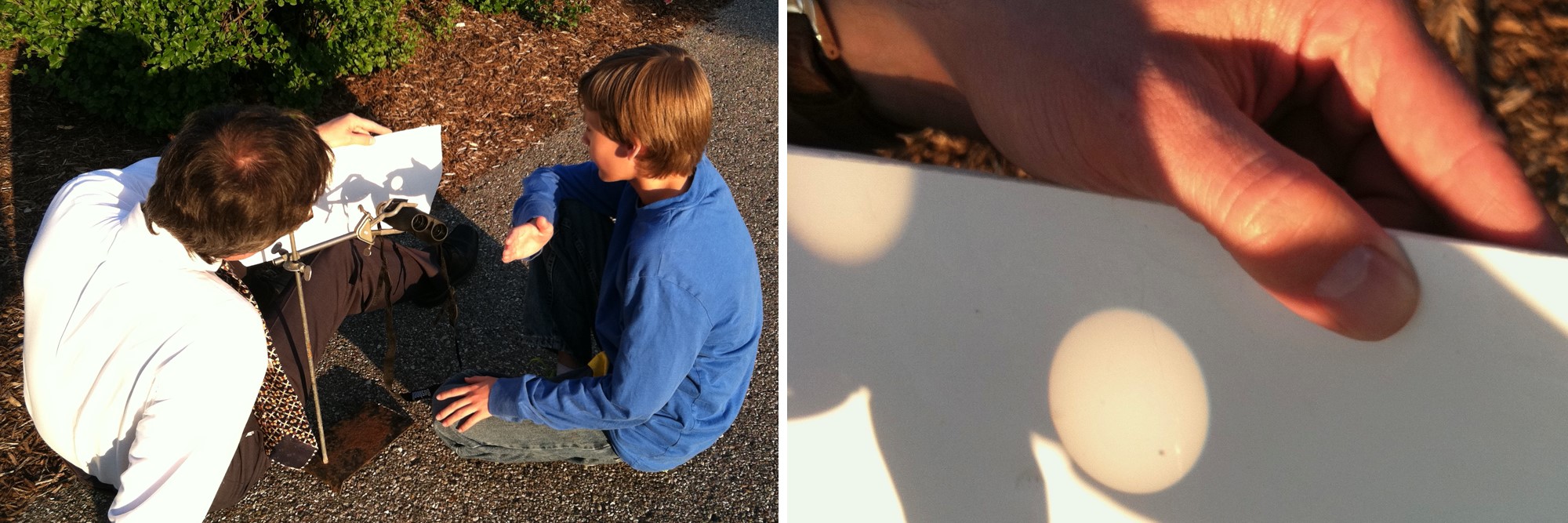Dean's Update
June 27, 2025 - Aron Sousa, MD

Aron and his son, on the right, observing the transit of Venus on June 5, 2012. They are using a chemistry stand to hold and align binoculars that project the sun’s image and Venus’ transit of the sun onto a white board.
Friends,
Next week is the 249th anniversary of the Declaration of Independence. Last month, I happened to be in Philadelphia and ambulated my way over to Independence Hall as a part of my usual Philly pilgrimage. Hard by Independence Hall is the American Philosophical Society (APS), which is one of the sites of the early public readings of the Declaration. Four of the five members of the Declaration drafting committee, including Jefferson, Franklin, and Adams, and fifteen signees were members of APS.
Back in the eighteenth century, science, as we know it, was encompassed within “natural philosophy,” because philosophy was a broadly understood study of the world. It is from that construct that we use PhD, Doctor of Philosophy, as the graduate degree for scientists. But I digress. As I said, one of the early readings of the Declaration occurred at the APS - on a platform built by the APS to observe the transit of Venus.
I like the juxtaposition of scientific investigation (the astronomical observation of the transit), philosophy, and the founding of our scrappy new democracy, because each of those exciting new Enlightenment ideas come together in one block in Philadelphia. The Enlightenment was a liberating philosophical movement for the natural philosophers and the more modern sense of philosophers, whose work enabled the basic ideas in the Declaration. Concepts like the ability of people to self-govern, the illegitimacy of monarchy, the rights of individuals, and ability of people to understand the world through observation and scientific process are interdependent products of the Enlightenment. And, in honor of that remarkable product of the Enlightenment, I aim to produce nothing next Friday, so there will be no Town Hall and no Update next week. Given the work our people have been doing, a three-day weekend is the least they deserve.
For the last few months, our chief financial officer, Brad Kline, has been engaged in nearly every dean’s office meeting (or as it seems) as we continue working through the 9% university-wide budget reductions, which we submitted on June 6. We are actively responding to questions from the university budget team as they come in, with hopes of receiving a final notice to proceed forward in the next few days. Brad and his office will be communicating plans once official approval is received.
The clinical situation of our faculty and departments has been at the top of the list of the financial team’s work for the last…forever. The college is no longer able to subsidize clinical work outside primary care, but we are working to find the best possible solutions for our clinicians. Since each practice is a bit different, there are many individual circumstances the finance team must understand and analyze. Brad and Associate Dean for Clinical Affairs Supratik Rayamajhi have been tireless through the last few months. They meet with the departments, the hospitals, the faculty, HCI, and OHS to try to sort through the facts and get to better situations. They really have been astonishing, and they produce results for the college.
The product of the college’s investment and work in public health has been one of the unique and distinctive efforts of Michigan State University. Very few universities can meld community outreach and partnership with clinical and scientific expertise like Michigan State, and one of the best examples of this is the Rx Kids effort of the Pediatric Public Health Initiative in the Charles Stewart Mott Department of Public Health. A bold effort to improve health in underserved communities, Rx Kids has quickly become the largest cash transfer program of its kind in the country, and under its director and founder, Mona Hanna, MD (’02), MPH, and team, have raised $100M for the program which is now in eight communities across the state. August 1, Clare County enters the program. Through the Midland Campus and our partners at MyMichigan Health, Clare County is one of the college’s Rural Community Health Program community sites for medical students, and the people of the county struggle with substantial poverty and health challenges. It is also underserved, which is why our students and programs serve there.
Aron Sousa, MD, FACP
Dean, Michigan State University College of Human Medicine

